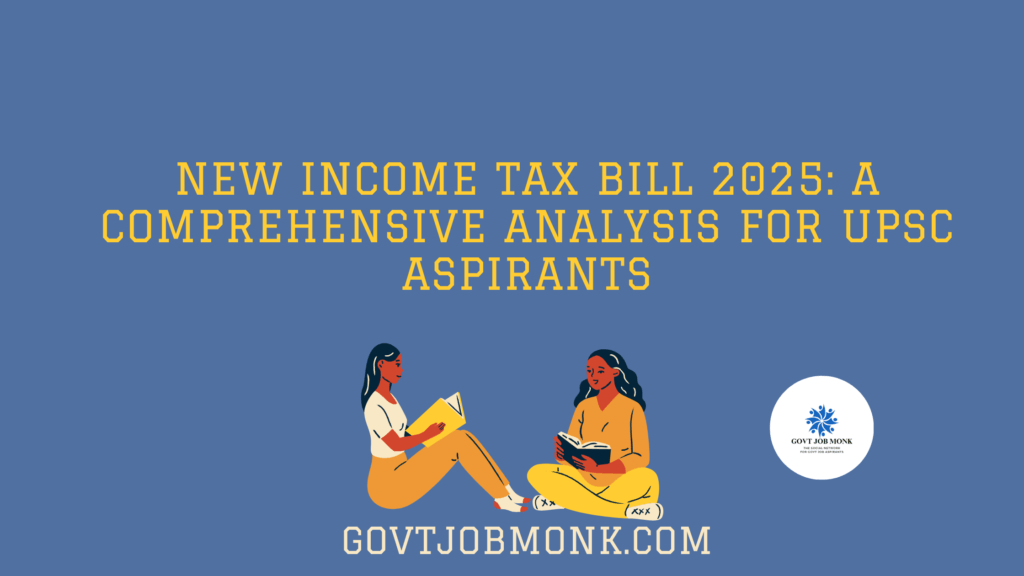Explore the New Income Tax Bill 2025, its key provisions, impact on taxpayers, and governance reforms. A must-read for UPSC aspirants preparing for GS papers.
The Indian government recently introduced the New Income Tax Bill, 2025 in Parliament, aiming to replace the six-decade-old Income Tax Act of 1961. This proposed law seeks to simplify taxation, modernize legal provisions, and enhance tax administration.
For UPSC aspirants preparing for General Studies (GS) papers, particularly GS-III (Economic Development) and GS-II (Governance, Transparency, and Accountability), understanding the bill’s implications is crucial. This article provides a detailed breakdown of the bill, its rationale, key provisions, and possible economic and governance impacts.

1. Why a New Income Tax Bill?
The Income Tax Act, 1961, though periodically amended, has become increasingly complex over the years. Several provisions are outdated, leading to legal ambiguities and difficulties in compliance. The new bill aims to:
- Simplify Tax Laws: Use clear and concise language, replacing terms like “Assessment Year” with “Tax Year.”
- Enhance Transparency: Reduce interpretational disputes and make compliance easier.
- Improve Tax Administration: Integrate digital technology and enhance data access for tax authorities.
- Align with Global Standards: Incorporate international best practices for tax compliance.
The government also seeks to increase tax compliance while ensuring a taxpayer-friendly approach.
2. Key Features of the New Income Tax Bill 2025
(A) Structural and Linguistic Simplification
- The bill consists of 536 clauses across 622 pages, compared to the previous 823-page Income Tax Act.
- Obsolete provisions have been removed or consolidated.
- Legal jargon has been simplified, making the law easier to interpret.
(B) Taxpayer-Friendly Provisions
- Tax Exemption Limit Raised: Individuals earning up to ₹12 lakh annually will be exempt from tax.
- Rationalized Tax Rates: Clear tabular structures will replace complex tax computations.
- Simplified Deductions & Exemptions: Redundant deductions have been removed to streamline tax filing.
(C) Digital Access and Investigation Powers
- Tax authorities can access digital records like emails, social media accounts, and mobile devices during investigations.
- This provision is meant to curb tax evasion but raises concerns about privacy and surveillance.
- Legal safeguards will likely be introduced to balance enforcement with privacy rights.
(D) Implementation Timeline
- The bill is under parliamentary review and may be enacted by April 1, 2026.
- A transition plan will be implemented to ensure a smooth shift from the 1961 Act to the new regime.
Also Read: President’s Rule in Manipur: A Constitutional Analysis for UPSC Aspirants
3. Impact on Economy and Governance
(A) Economic Impact
- Boost to Middle-Class Spending
- Higher tax exemption will increase disposable income, boosting demand and economic growth.
- Simplification May Improve Compliance
- A clear, user-friendly tax system reduces evasion and litigation, increasing government revenues.
- Concerns Over Privacy & Digital Surveillance
- Tax authorities’ access to digital records raises privacy risks, requiring strong legal safeguards.
(B) Governance & Transparency
- Ease of Doing Business
- Simplified tax laws will attract foreign investments and improve India’s ranking in Ease of Doing Business.
- Potential for Taxpayer Grievances
- The expansion of investigative powers could lead to misuse, requiring robust oversight.
4. UPSC GS Relevance & Important Questions
GS-II (Governance, Constitution, and Transparency)
- How does the New Income Tax Bill 2025 improve tax administration?
- Analyze the privacy concerns associated with granting tax authorities digital access to taxpayer records.
- Discuss the role of legislative oversight in preventing misuse of tax laws.
GS-III (Indian Economy & Taxation Reforms)
- How will the new tax bill impact middle-class consumption and economic growth?
- Compare the old tax system (1961 Act) with the new one in terms of efficiency and transparency.
- Evaluate the impact of rationalized tax rates on India’s fiscal policy.
Also Read : Uniform Civil Code (UCC) in India: A Detailed Analysis
5. Conclusion: Balancing Simplicity, Compliance & Privacy
The New Income Tax Bill 2025 is a historic reform aimed at simplifying taxation, increasing compliance, and making tax laws more accessible. While its simplified structure and higher exemption limits benefit taxpayers, concerns about digital surveillance and privacy violations must be addressed with clear legal safeguards.
For UPSC aspirants, this bill is a crucial topic covering economic development, governance, and fiscal policy. Understanding its nuances will help in answering mains questions and tackling essay topics on tax reforms and digital governance.
Further Reading & References
- Reuters: India’s New Income Tax Bill & Digital Access Provisions
- Times of India: Highlights of the New Income Tax Bill 2025
This blog provides UPSC-relevant insights, simplifying a complex legal reform into a structured analysis. If you have any questions or need further clarifications, drop a comment below!
Join GovtJob MONK, the ultimate social network platform for government job aspirants! Connect with like-minded individuals, discuss strategies, and stay motivated. Access the Activity Page to engage with the community, and visit our Updates Page for the latest notifications and free study material. Need instant guidance? Try MonkGPT, our AI chat assistant, to help you with your preparation. Together, let’s achieve your dream job!
Aspirants preparing for UPSC, State PSC, and other competitive exams can use GovtJobMONK to access free study material, expert-written articles, and structured essay guides. Covering a wide range of topics, from governance and economy to ethics and current affairs, the content is designed to enhance analytical skills and answer-writing techniques. With well-researched insights, model essays, and exam-oriented resources, this platform helps candidates build a strong foundation and improve their performance in both prelims and mains. Stay updated with quality study material, all available for free, to streamline your exam preparation effectively.
czff97
Good https://is.gd/N1ikS2
Awesome https://is.gd/N1ikS2